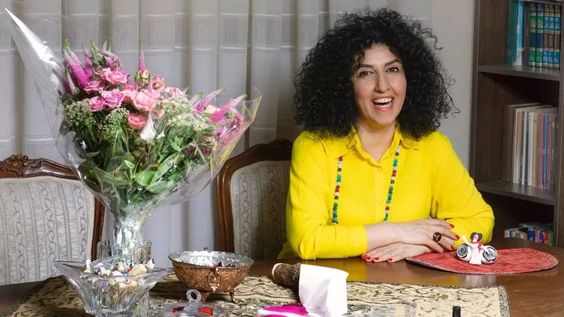World
Narges Mohammadi: Iranian woman jailed for promoting rights receives Nobel Peace Prize

Human rights advocate Narges Mohammadi, who is now incarcerated, has been awarded the 2023 Nobel Peace Prize.
The 51-year-old Ms. Mohammadi received the award, according to the Norwegian Nobel Committee, for her struggle against women’s repression in Iran.
According to committee head Berit Reiss-Andersen, her struggle has cost her a “tremendous personal cost.”
Currently, Ms. Mohammadi is incarcerated for ten years in Tehran’s notorious Evin prison.
Iran’s response has been to charge the Nobel committee with interference.
Giving the award to someone who has been found guilty and is presently serving a jail sentence, according to the official news agency IRNA, “can only be called politicising the concept of human rights and acting in a meddling manner.”
The honour was granted to Ms. Mohammadi for “her fight against the oppression of women in Iran and her fight to promote human rights and freedom for all,” according to Ms. Reiss-Andersen, who spoke at the ceremony on Friday in Oslo.
She opened her speech with the phrase “woman, life, freedom” in allusion to the recent slogan of the widespread protests taking place in Iran.
She continued by saying that the award was given in honour of the hundreds of thousands of Iranians who had rallied against the “theocratic regime’s policies of discrimination and oppression targeting women” over the course of the previous year. She claimed that the movement was led by the newly awarded Nobel Prize.
Along with human rights advocates all throughout the world, millions of Iranians will be celebrating this prize. The decision of the Nobel committee also sends the Iranian government a very clear message of displeasure.
Ms. Reiss-Andersen also requested Iran to free Ms. Mohammadi from prison so that she might attend the award ceremony in December during the ceremony.
“If the Iranian authorities make the right decision they will release her so she can be present to receive this honour, which is what we primarily hope for.”
But it appears extremely improbable that the activist will be able to claim her award.
According to the UN, the prize recognised “the courage and tenacity of Iranian women and how they are an inspiration to the world.”
British-Iranian Nazanin Zaghari-Ratcliffe, who stayed in Evin prison alongside Ms Mohammadi until her release in March 2022, expressed her happiness for her companion.
“I cry when I see it. She went above and above for all of us in Evin. For her bold struggle against the mistreatment of women’s rights, the use of solitary confinement, and execution in the Iranian legal system, Narges is an inspiration and a pillar to the women in the female ward in Evin.
“This award belongs to every single Iranian woman who, one way or another, has been and remains a victim of injustice in Iran.”
Ali Rahmani, Ms. Mohammadi’s son, who she hasn’t seen in eight years, found out in class.
“I was very happy and felt proud of my mum,” he told the BBC.
“It took me a while to adjust, so at first I was just as glad and proud of my mother as I always am, exactly like yesterday and the day before that. The Iranian people are entitled to this honour. The protests are the reason.
Emmanuel Macron of France described Ms. Mohammadi as a “freedom fighter who each time faced the reality… the cruelty of this regime,” while Abram Paley, the interim US envoy on Iran, praised her bravery.
Ms. Mohammadi has been detained 13 times, found guilty five times, and given a total of 31 years in prison in addition to her current sentence. Additionally, she was given a 154-lash sentence; however, it is unknown if she has actually received those lashes.
She described to the BBC in agonising detail how Iranian women caught during demonstrations were subjected to physical and sexual harassment in a letter she sent from prison last December.
She claimed that during the protests that followed the death of Mahsa Amini, 22, while in the custody of the police, in September 2022, such assaults had increased in frequency.
Later, the discontent extended throughout the nation, with demands ranging from increased liberties to the toppling of the government.
The world was enthralled by pictures of Iranian ladies bravely igniting their headscarves. However, the protests have largely receded as a result of the severe crackdown by the Iranian government on them.
Ms. Mohammadi is the center’s deputy director for human rights.
In an interview with the BBC in 2020, Ms. Mohammadi gave an explanation of her motivation for devoting her life to furthering women’s rights in Iran.
“In my opinion, supporting human rights efforts and actions aimed at achieving freedom and justice anywhere in the world, whether in Iran or any other country, is very important and very heart-warming,” she stated.
She was listed in the BBC’s 100 Women last year, a well-known list of 100 remarkable and powerful women from throughout the world.
